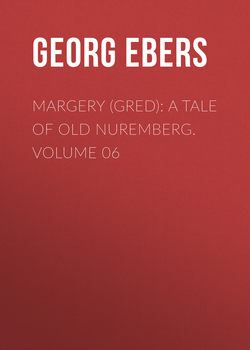Читать книгу Margery (Gred): A Tale Of Old Nuremberg. Volume 06 - Георг Эберс, Georg Ebers - Страница 2
CHAPTER VII
ОглавлениеHerdegen's departing marks my life's way with another mile-stone. All fears about him were over, and a great peace fell upon me.
I had learnt by experience that it was within my power to be mistress of any heart's griefs, and I could tell myself that dull sufferance of woe would have ill-pleased him whose judgment I most cared for. To remember him was what I best loved, and I earnestly desired to guide my steps as would have been his wish and will. In some degree I was able to do so, and Ann was my great helper.
My eyes and ears were opened again to what should befall in the world in which my lover had lived; all the more so as matters now came about in the land and on its borders which deeply concerned my own dear home and threatened it with great peril.
After the Diet was broken up, the Elector Frederick of Brandenburg was forced to take patience till the princes, lords, and mounted men-at-arms sent forth by the townships, five or six from each, could muster at his bidding to pursue the Hussites in Bohemia. One year was thus idly spent; albeit the Bohemian rebels meanwhile could every day use their weapons, and instead of waiting to be attacked marched forward to attack. Certain troops of the heretics had already crossed the borders, and our good town had to strengthen its walls and dig its moat deeper to make ready for storm and siege. Or ever the Diet had met, many hands had already been at work on these buildings; and in these days every man soul in Nuremberg, from the boys even to the grey-haired men, wielded the spade or the trowel. Every serving-man in every household, whether artisan or patrician—and ours with the rest—was bound to toil at digging, and our fine young masters found themselves compelled to work in sun or rain, or to order the others; and it hurt them no more than it did the Magister, whose feebleness and clumsiness did the works less benefit than the labor did to his frail body.
Wheresoever three men might be seen in talk, for sure it was of state- matters, and mostly of the Hussites. At first it would be of the King's message of peace; of the resistance made by the Elector Palatine, Ludwig, in the matter of receiving the ecclesiastical Elector of Mainz as Vicar- general of the Empire; of the same reverend Elector's loss of dignity at Boppard, and of the delay and mischief that must follow. Then it was noised abroad that the Margrave Frederick of Meissen, who now held the lands of the late departed Elector Albrecht of Saxony in fief from the King, and whose country was a strong bulwark against the Bohemians, was about to put an end to the abomination of heresy. Howbeit, neither he nor Duke Albrecht of Austria did aught to any good end against the foe; and matters went ill enough in all the Empire.
The Electors assembled at Bingen made great complaints of the King tarrying so far away, and with reason; and when he presently bid them to a Diet at Vienna they would not obey. The message of peace was laughed to scorn; and how much blood was shed to feed the soil of the realm in many and many a fight!
And what fate befell the army whereon so great hopes had been set? The courage and skill of the leader were all in vain; the vast multitude of which he was captain was made up of over many parts, all unlike, and each with its own chief; and the fury of the heretics scattered them abroad. Likewise among our peaceful citizens there was no small complaining, and with good cause, that a King should rule the Empire whose Realm of Hungary, with the perils that beset it from the Ottoman Turks, the Bohemians, and other foes, so filled his thoughts that he had neither time, nor mind, nor money to bestow due care on his German States. His treasury was ever empty; and what sums had the luckless war with Venice alone swallowed up! He had not even found the money needful to go to Rome to be crowned Emperor. He had failed to bring the contentious Princes of the Empire under one hat, so to speak; and whereas his father, Charles IV., had been called the Arch-stepfather of the German Empire, Sigismund, albeit a large-hearted, shrewd, and unresting soul, deserved a scarce better name, inasmuch as that he, like the former sovereign, when he fell heir to his Bohemian fatherland, knew not how to deal even with that as a true father should.
